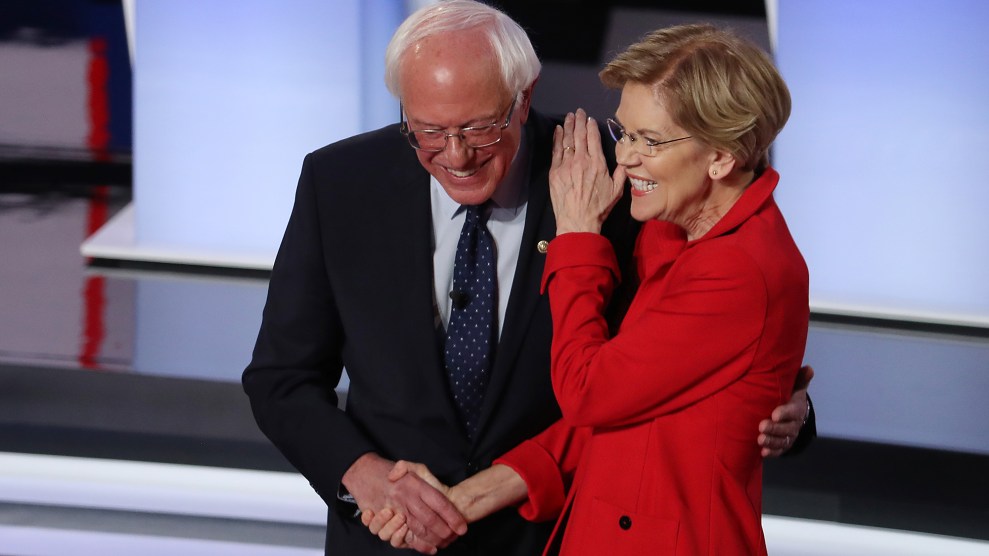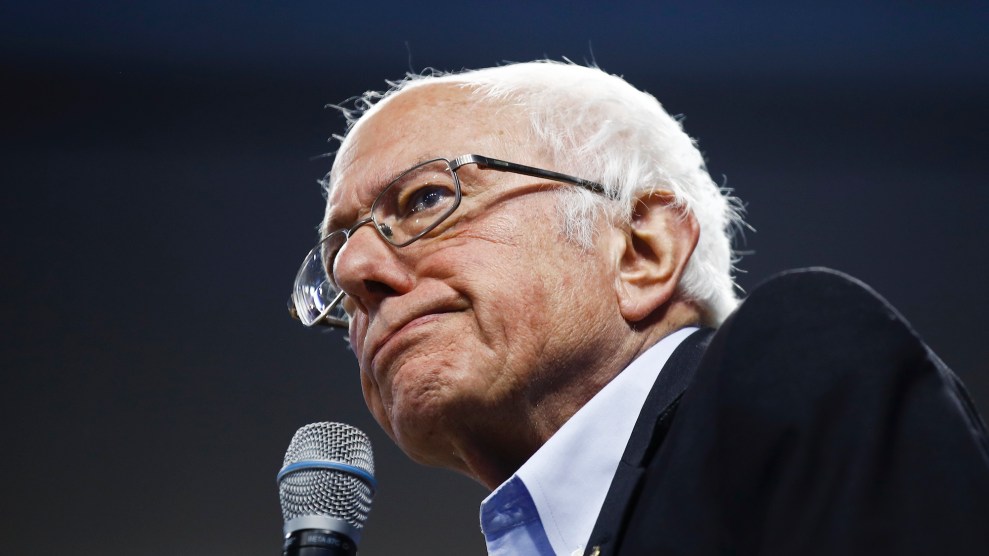
Sens. Bernie Sanders and Elizabeth Warren at the Democratic Presidential Debate in Detroit in July 2019.Justin Sullivan/Getty Images
Of all the Democratic presidential candidates, Sen. Bernie Sanders and Sen. Elizabeth Warren have been the harshest critics of big tech. Both have promised to break up Amazon, Apple, and Alphabet (Google’s parent company), which they say are monopolies. Sanders successfully pressured Amazon into increasing minimum wage for its employees to $15, and Warren’s proposed “wealth tax” would undoubtedly make a big dent in dot-com CEOs’ assets.
Yet Sanders’ and Warren’s skepticism toward Silicon Valley isn’t entirely mutual. The two have raised more money from the employees of 20 major tech companies than any other candidates, though tech execs were more enthusiastic about seeding Pete Buttigieg’s failed startup campaign.
Overall, 96 percent of tech employees’ $2 million in donations went to Democrats, though President Trump brought in more than Amy Klobuchar and Tom Steyer, who have since dropped out of the race. Google employees gave just under $700,000 to Democratic candidates, with more than half going to Sanders and Warren.
Who’s getting tech workers’ money
To get a sense of how the presidential race is playing out in Silicon Valley and other tech hubs, we analyzed more than 20,000 Federal Election Commission records of contributions to presidential candidates by the employees of 20 well-known technology companies including Google, Microsoft, Facebook, Twitter, Apple, Salesforce, Amazon, and Netflix (and their major subsidiaries). The data only includes gifts made in 2019, so no contributions to Michael Bloomberg were counted.
A deeper look at the numbers shows that the candidates’ support splits among different levels of of workers. Warehouse workers, shoppers, technicians, administrative assistants, rideshare drivers, and support staff from Amazon, Uber, Lyft and other tech companies overwhelmingly backed Sanders, followed by Trump. More than 50 gig workers who identified themselves as drivers for Uber, Lyft, Amazon, and Instacart gave to Sanders. Tesla assembly line workers, PayPal customer support representatives, and Intel manufacturing technicians overwhelmingly gave to Sanders. (We counted gig workers even though some companies do not treat them as employees. To avoid double counting, gig workers who listed two employers were not included.)
Gig workers feel the Bern
This trend flipped when we looked at tech executives, directors, vice presidents, and other members of the C-suite. They overwhelmingly gave to Pete Buttigieg and former Vice President Joe Biden, more moderate candidates who haven’t taken positions that threaten tech companies. Among Buttigieg’s contributors were Pinterest’s CEO and chief operating officer, Lyft’s chief technology officer and chief strategy officer, Microsoft’s chief technology officer, and Google, Apple and Saleforce’s chiefs of staff. Biden’s supporters included vice presidents and senior vice presidents at Amazon, Google, Microsoft, and Apple.
Mayor Pete could compete—in the C-Suite
A majority of the tech workers who have made contributions to presidential candidates are managerial and mid-level employees such as engineers, managers, and analysts. They mostly gave to Sanders and Warren, who together got three-quarters of the contributions from these employees. The gap between Sanders and Warren among this group was quite narrow, suggesting no clear front runner.
Mid-level tech workers split for Sanders and Warren
Looking at each of the remaining candidates’ contributions from different types of tech workers shows how Sanders and Warren are winning Silicon Valley’s money—but Biden is doing well in the boardroom.

















